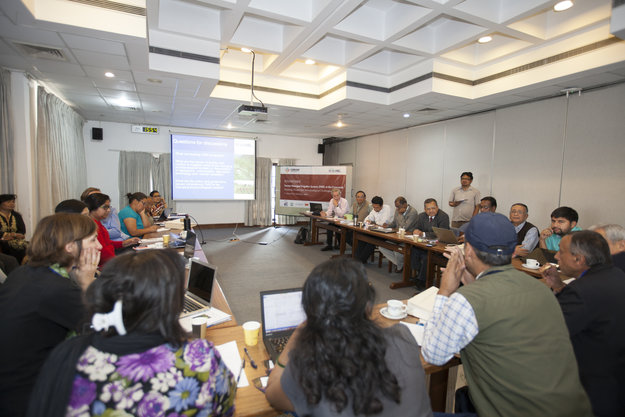| Nepal has a long history of irrigation water management by farmers where they take the sole responsibility of operating and maintaining irrigation systems. In the absence of strong government intervention in the past, farmer managed irrigation systems (FMIS) have slowly evolved through collective effort of farmers to irrigate their agricultural land. According to the Department of Irrigation (DOI), FMIS irrigate about 645,716 hectare of command area which is about 67 percent of total surface water irrigation.1 In Nepal, FMIS are characterized by the use of low-cost technology appropriate for heterogeneous local conditions, autonomous decision making suited to local contexts, and collective action by farmers for the operation and maintenance of the irrigation systems. |
 A view of the rountable A roundtable on farmer-managed irrigation systems (FMIS) was organized by the HI-AWARE consortium. The objectives of this roundtable were to facilitate the discussion on the key challenges faced by FMIS and explore the possibility of its revival as an adaptive response against climatic variability and change. The roundtable focused on three thematic questions – factors leading to decline of FMIS, issues of access to and control of irrigated water in changing context, and policies and governance issues constraining its performance. Some of the key issues facing FMIS are competing water demands, feminization of irrigated agriculture, changing technology, climatic variability, and weak governance. Since FMIS have survived decades of changes, they are likely to possess characteristics of a resilient system. However, more research is needed to understand how FMIS are evolving and innovating to address the multiple drivers of change. A system level assessment of FMIS is necessary in order to understand the diverse causal factors leading to its decline. Focusing on the farmers and local institutions, research is needed to understand the pathways of evolution and innovation done by them. This roundtable serves the first stage of discussion in studying the role FMIS can play in strengthening the adaptive capacity and resilience of irrigated agriculture.
A view of the rountable A roundtable on farmer-managed irrigation systems (FMIS) was organized by the HI-AWARE consortium. The objectives of this roundtable were to facilitate the discussion on the key challenges faced by FMIS and explore the possibility of its revival as an adaptive response against climatic variability and change. The roundtable focused on three thematic questions – factors leading to decline of FMIS, issues of access to and control of irrigated water in changing context, and policies and governance issues constraining its performance. Some of the key issues facing FMIS are competing water demands, feminization of irrigated agriculture, changing technology, climatic variability, and weak governance. Since FMIS have survived decades of changes, they are likely to possess characteristics of a resilient system. However, more research is needed to understand how FMIS are evolving and innovating to address the multiple drivers of change. A system level assessment of FMIS is necessary in order to understand the diverse causal factors leading to its decline. Focusing on the farmers and local institutions, research is needed to understand the pathways of evolution and innovation done by them. This roundtable serves the first stage of discussion in studying the role FMIS can play in strengthening the adaptive capacity and resilience of irrigated agriculture.
A link to the FMIS rountable proceedings can be found at HIMALDOC, here.
